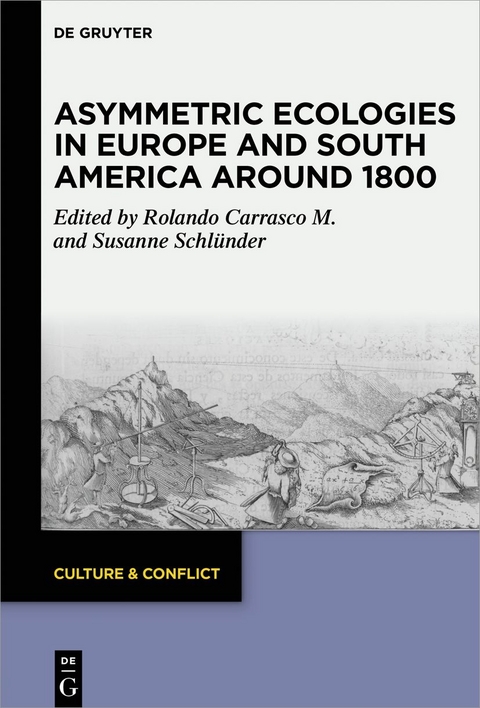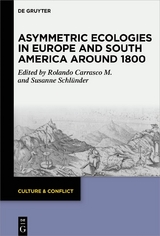Asymmetric Ecologies in Europe and South America around 1800
Seiten
2022
De Gruyter (Verlag)
978-3-11-073818-6 (ISBN)
De Gruyter (Verlag)
978-3-11-073818-6 (ISBN)
The series Culture and Conflict aims to promote a dynamic, pluridisciplinary dialogue meant to discuss the multiple ways in which conflict influences, supports or constrains the production of meaning in modernity. It publishes innovative original scholarship from the fields of literary and cultural studies as well as media, visual and film studies. Culture and conflict inevitably go together. The very idea of culture is marked by the notion of difference and creative, i.e., conflictual interaction. Differential markers, such as self and other, inside and outside, high and low, pure and dirty, old and new, support the key themes of the study of culture, e.g., identity and diversity, memory and trauma, translation of cultures and globalization, mediation and exclusion. The new series Culture and Conflict aims to promote a dynamic, pluridisciplinary dialogue meant to discuss the multiple ways in which conflict influences, supports or constrains the production of meaning in modernity. It publishes innovative original scholarship from the fields of literary and cultural studies as well as media, visual and film studies.
This volume proposes new ways of understanding the historical semantics of the relationship between humans and nature in South America in the eighteenth and early nineteenth centuries. The authors in this volume use the notion of asymmetry to discuss the representations of and forms of knowledge about nature circulating in, and about, colonial and postcolonial South America. They argue that the production of knowledge about the American natural space widened the power gap between the Europeans colonizers and the local population. This gap, therefore, rests on what we call 'asymmetric ecologies': Eurocentric epistemic orders excluded forms of indigenous, mestizo, and Creole knowledge about nature. By looking at literary as well as non-literary sources, such as natural histories, travel narratives, encyclopaedias or medical writing, the essays in this volume trace the origins of new theoretical paradigms (ecocriticism, biopolitics, transarea studies, etc.), and examine the regional cultural, identity, and epistemic conflicts that undercut the Eurocentric narrative of enlightened modernity.
This volume proposes new ways of understanding the historical semantics of the relationship between humans and nature in South America in the eighteenth and early nineteenth centuries. The authors in this volume use the notion of asymmetry to discuss the representations of and forms of knowledge about nature circulating in, and about, colonial and postcolonial South America. They argue that the production of knowledge about the American natural space widened the power gap between the Europeans colonizers and the local population. This gap, therefore, rests on what we call 'asymmetric ecologies': Eurocentric epistemic orders excluded forms of indigenous, mestizo, and Creole knowledge about nature. By looking at literary as well as non-literary sources, such as natural histories, travel narratives, encyclopaedias or medical writing, the essays in this volume trace the origins of new theoretical paradigms (ecocriticism, biopolitics, transarea studies, etc.), and examine the regional cultural, identity, and epistemic conflicts that undercut the Eurocentric narrative of enlightened modernity.
Susanne Schlünder and Rolando Carrasco, Osnabrück University, Germany.
| Erscheinungsdatum | 10.05.2022 |
|---|---|
| Reihe/Serie | Culture & Conflict ; 21 |
| Zusatzinfo | 16 b/w and 14 col. ill. |
| Verlagsort | Berlin/Boston |
| Sprache | englisch |
| Maße | 155 x 230 mm |
| Gewicht | 607 g |
| Themenwelt | Geschichte ► Teilgebiete der Geschichte ► Kulturgeschichte |
| Geisteswissenschaften ► Sprach- / Literaturwissenschaft ► Literaturwissenschaft | |
| Schlagworte | Concepts of Nature • Eurocentrism • human-Environment Relations • Spanish American Enlightenment |
| ISBN-10 | 3-11-073818-X / 311073818X |
| ISBN-13 | 978-3-11-073818-6 / 9783110738186 |
| Zustand | Neuware |
| Haben Sie eine Frage zum Produkt? |
Mehr entdecken
aus dem Bereich
aus dem Bereich
der stille Abschied vom bäuerlichen Leben in Deutschland
Buch | Hardcover (2023)
C.H.Beck (Verlag)
23,00 €
vom Mittelalter bis zur Gegenwart
Buch | Softcover (2024)
C.H.Beck (Verlag)
12,00 €
eine Geschichte der Welt in 99 Obsessionen
Buch | Hardcover (2023)
Klett-Cotta (Verlag)
22,00 €




